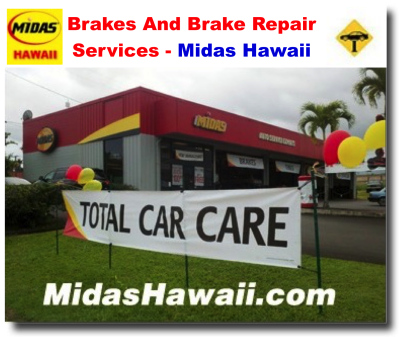Brakes And Brake Repair Services
- Tweet

Brakes And Brake Repair Services
"We do more break jobs than anyone else"
...especially in Hawaii!!!
When it's time for brake repair, brake service or brake inspection, trust North America's brake service leader. At Midas, we service brakes throughout the US and Canada. So no matter where the road takes you, Midas will be there for you.
Midas technicians know every part of your brake system inside and out. Our full line of brakes and brake repair services is the reason we're North America's brake service leader. When you purchase brake pads and brake shoes at Midas, you also get the famous Midas lifetime guarantee* -- once you purchase brake pads or brake shoes from us, you will never need to pay for replacements again, for as long as you own your car.
Our brake pads and brake shoes come with the famous Midas lifetime guarantee* -- once you purchase brake pads or brake shoes at Midas, you will never need to pay for replacements again, so long as you own your car.
Here's a way to help ensure safety while behind the wheel -- get your brakes inspected and serviced by the best before you hit the road.
Better still, when you come to a Midas for brake service, we include a courtesy check of your vehicle's major systems and components...for your increased peace of mind.
Remember, regular brake inspections should be part of your vehicle's ongoing maintenance, helping to ensure its safety and reliability. At Midas, we will examine your brakes, explain what's needed and provide a written estimate before any work is done.
The safety and reliability of your car is important to us. So, talk to your Midas mechanic if you experience any of these symptoms:
- Low or spongy brake pedal
- Hard brake pedal
- Brake warning light that stays on
- Continuously squealing brakes
Remember, any time you notice any of these symptoms or any others with your car brakes, it's a good idea to have them checked. In fact, we recommend that you have them inspected once a year.
* See shop for applicability and limited guarantee details.
About your brakes
Your car's brakes are made up of a number of components that bring your car to a stop. From your brake pedal to hydraulic brake fluids, brake master cylinder to power brake boosters, drum brakes to disc brakes, the brake system is critical to safe vehicle operation.
Your trusted Midas mechanics are experts in brake service and brake repair. No one in America does more brakes than Midas.
Q: Why do my brakes squeak?
A: Brakes can squeak for a variety of reasons, but continuous squeals and grinding sounds may mean it's time for new brake pads or shoes. Worn brakes can mean longer stopping distances and difficulty stopping in an emergency situation. Rotors and drums that are too thin may even become over-stressed and break.
Remember, if you notice any of these symptoms it's a good idea to have your brakes checked. In fact, we recommend that you have them inspected once a year. It's essential to be proactive about testing overall brake components to know whether a brake component needs simply to be serviced or totally replaced. Regular brake service and, when needed, simple brake repairs can mean a safer ride.
Q: My brake pedal feels really soft and spongy. Is this normal?
A: Definitely not. A low or spongy pedal can mean there's air in your car's brake hydraulic system. If that hydraulic pressure is too low, then your car's brake pads or shoes won't be able to apply enough force and friction to slow and/or stop your car safely. Again, an inspection of your car's brake system is strongly advised.
FAQ LEGEND
Back to the top
Brakes & Brake Repair Questions
A. You get used to your brakes. How they sound, how the pedal feels -- and how quickly they stop your vehicle. Then one day, your brakes just aren't the same. Your brakes sound funny. Your pedal feels funny -- and you need to press it farther. Worst of all, it takes longer and longer to come to a stop.
We created Midas Secure Stop® brake service for you. We hate surprises (at least behind the wheel) as much as you do. But we know change is inevitable. Brake pads and rotors wear out from the immense friction and heat they encounter. Air gets into brake lines. And your brake system has dozens of other components that can wear out at any time. It takes Midas expertise to bring your braking confidence back.
When you come in for any brake problem, our Midas Auto Service Experts® conduct a 55-point inspection of your brakes. Then we take the time to thoroughly explain your vehicle's condition and tell you which problems are urgent (and which can wait). We discuss the best options for your budget and provide a written estimate before making any repairs.
A. Brakes can squeak for a variety of reasons, but continuous squeals and grinding sounds may mean it's time for new brake pads or shoes. Worn brakes can mean longer stopping distances and difficulty stopping in an emergency situation. Rotors and drums that are too thin may even become over-stressed and break.
A.
- 55-Point Brake Inspection -- to diagnose that spongy brake pedal, discover why your brake light is on, or just check out your brakes as part of routine maintenance.
- Brake Pad Replacement -- for routine brake maintenance.
- Brake Rotor Service -- to complete your brake pad replacement. We'll smooth out brake pad wear if necessary, or recommend new rotors if you need them.
- Brake Shoe Replacement -- similar to brake pad replacement, for drum style brakes.
- Brake Drum Service -- similar to brake rotor service, for drum style brakes.
- Brake Fluid Service -- from routine brake fluid exchange to brake fluid leak repair.
- Anti-Lock Brake System (ABS) Service -- from your ABS sensors to the system computer module.
- Brake Repair -- to all parts of your brake system, from the power brake booster to the parking brake assembly.
Whether you suspect a brake problem (thanks to your brake light, brake pedal, or a suspicious leak), or you've just hit your vehicle's recommended service interval, start by requesting a brake service appointment.
A. Common brake services include:
- Brake pad or brake shoe replacement
- Brake rotor resurfacing or brake drum turning
- Brake rotor or drum replacement
- Brake fluid exchange or flushing
- Brake line leak repair
- Brake light diagnosis
What's included in a brake job depends on where each part is in its lifecycle. For example, you may or may not need new rotors with your replacement brake pads. But some brake services need to be duplicated on both wheels of the same axle. Multiple systems in your vehicle are designed for the parts on both sides of your vehicle to be in matching condition.
A brake inspection should include a check of all brake parts and connectors, dashboard lights, external brake lights, brake fluid condition, and hydraulic pressure through the brake lines.
A. Depending on your vehicle, climate, brake parts, and driving patterns, your brake pads or shoes may last anywhere from 20,000 to 80,000 miles. Brake fluid can last 2-5 years. With such an unpredictable replacement cycle, regular brake inspection is essential. Check your vehicle owner's manual for your brake inspection schedule -- every 10,000-12,000 miles or every year are common recommendations.
A. You may need new brake pads, rotors, or new brake fluid when you notice any new sound or diminished pedal response when you brake. Worn brake pads can squeak -- and the situation will worsen until you hear the grinding sound of unprotected rotors. Worn pads and low brake fluid pressure can each cause a nerve-wracking delay in pedal response. Warped rotors cause vibrations when braking (not to be confused with the expected pulsing sensation of your ABS kicking in).
A. Here are some common signs of failing brakes:
- Dashboard lights or warnings - Your BRAKE light, ABS light or Check Engine light may indicate brake problems.
- Leaking brake fluid - Any fluid leak should be inspected.
- Any change in brake response - Taking longer to stop or needing to press the pedal farther are classic symptoms of brake trouble.
- Any new noise when braking - Squealing, grinding, squeaking, or rattling? Check the brake pads and rotors. Hissing sounds? Suspect a brake fluid leak problem.
- Any shaking or vibration when braking - Rough stops may mean warped rotors. (But a pulsing pedal can simply be your ABS in action.)
- Soft or spongy brakes - Spongy brakes suggest a problem in your brake fluid lines, or brake shoes.
- Hard or stiff brakes - You may have contaminants in the brake fluid or a bad seal on the master cylinder or brake booster.
- Engine misfiring or stalling - You may have a bad power brake booster.
- Vehicle pulling to one side when braking -- You could have faulty brake hardware or an uneven hydraulic issue.
ref no:9545
Please send questions about this website to webmaster
Terms of Use / Legal Disclaimer / Privacy Statement
Site Designed and Managed by MacBusiness Consulting


